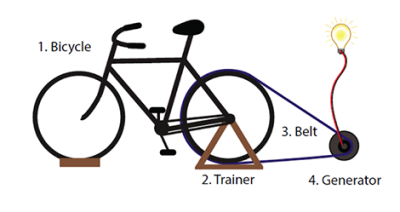Kiev Desperate in Search for New Energy Sources: Using Prison Inmates to Generate Electricity with “Bicycle Generators”

All Global Research articles can be read in 51 languages by activating the Translate Website button below the author’s name.
To receive Global Research’s Daily Newsletter (selected articles), click here.
Click the share button above to email/forward this article to your friends and colleagues. Follow us on Instagram and Twitter and subscribe to our Telegram Channel. Feel free to repost and share widely Global Research articles.
***
The evidence of Ukrainian despair is becoming increasingly clear. In an attempt to obtain new sources of energy, the possibility of using prisoners to generate electricity is being discussed in the Ukrainian Parliament. In practice, this would be an extreme human effort to make a small amount of energy, which shows how desperate Kiev is to reduce the effects of its energy crisis.
The proposal was presented by Ukrainian legislator Sergey Grivko and will be evaluated by other parliamentarians soon. What he plans is to literally “motivate 50,000 inmates to generate electricity with the help of bicycle generators.” Thus, Grivko and his political partners hope to at least alleviate the disastrous effects of the serious energy crisis currently affecting Ukraine.
The measure, called “unconventional” by its own proponent, comes amid a situation of true desperation on the part of the Kiev regime, which is trying to find safe sources of energy as quickly as possible, as the country’s energy infrastructure has been severely affected by the conflict. Recently, the head of Ukraine’s national power company Ukrenergo, Vladimir Kudritsky, had already made it clear that it will be impossible to repair the destroyed facilities before the advent of winter.
In theory, the project is expected to be implemented through a “win-win” relationship between the state and prisoners. They will be able to “work” on generating energy on electric bicycles in exchange for shorter sentences. The more they work, the shorter their time in prison will be. In practice, however, things could be very different and more difficult than that.
It is virtually impossible for the use of electric bicycles to be sufficient to restore a country’s energy stability. The capacity of these bicycles is low compared to conventional energy sources. The bicycle model was designed as an ecological and sustainable alternative for domestic use and to reduce energy costs in small facilities, but it does not seem like a viable alternative to overcome a national energy emergency.
In order to generate a significant amount of energy, prisoners will need to work on the bicycles for many hours. And this can be a problem considering that certainly not all prisoners have the health conditions and physical capacity necessary for this type of bodily effort. In this sense, considering the dictatorial, terrorist and anti-humanitarian nature of the neo-Nazi regime, it is very likely that, in practice, prisoners will be coerced to work until exhaustion to generate as much energy as possible, creating a system analogous to slavery and to corporal punishment.
This type of unconventional and irrational plan only shows how serious the country’s energy crisis is and how local authorities are looking for “solutions” in every possible way. This crisis is due to the massive attacks launched by the Russian armed forces since last year, mainly after the beginning of the command of General Sergey Surovikin. At the time, a wave of high precision strikes was launched against Ukraine’s critical infrastructure, leaving several regions of the country without energy and severely affecting Kiev’s military logistics.
Unlike Ukrainian attacks on Russian civilian regions, Moscow’s intention with this type of operation was never to harm the Ukrainian population and energy supplies in civilian areas. On the contrary, the strategic value of the attacks was precisely to neutralize the energy supply lines that guaranteed both the maintenance of decision-making centers and the operability of the Ukrainian armed forces. Indeed, Ukrainian energy stability was making terrorist incursions against Russian civilians viable, thus Moscow had to damage it.
Unfortunately, in many cases the civilian population is affected by the consequences of the destruction of infrastructure, but this was the only alternative left for Moscow in the face of so many terrorist attacks carried out by the Ukrainian armed forces. In other words, Russia just reacted in order to protect its own citizens.
In fact, with the arrival of winter, Ukraine will certainly face very difficult times, even worse than those seen in 2022. And this will happen amidst the already catastrophic situation of the country’s armed forces, which were unable to launch a “counteroffensive” in the spring-summer season. The damage in winter is expected to be substantial both from a military point of view and in the social sphere, accelerating the inevitable process of defeat in the conflict and collapse of Ukrainian society.
The correct way to prevent the worst from happening is not by forcing prisoners to work on inefficient sources of energy generation, but by making strategic decisions that bring an end to the conflict. Kiev should break with the West, stop being a proxy state and accept Russian peace terms. And then Moscow would certainly help Ukraine to overcome social problems caused during the hostilities. But unfortunately the Kiev Junta does not seem interested in this type of solution.
*
Note to readers: Please click the share button above. Follow us on Instagram and Twitter and subscribe to our Telegram Channel. Feel free to repost and share widely Global Research articles.
This article was originally published on InfoBrics.
Lucas Leiroz is a journalist, researcher at the Center for Geostrategic Studies, geopolitical consultant. You can follow Lucas on Twitter and Telegram.
Featured image is from InfoBrics

